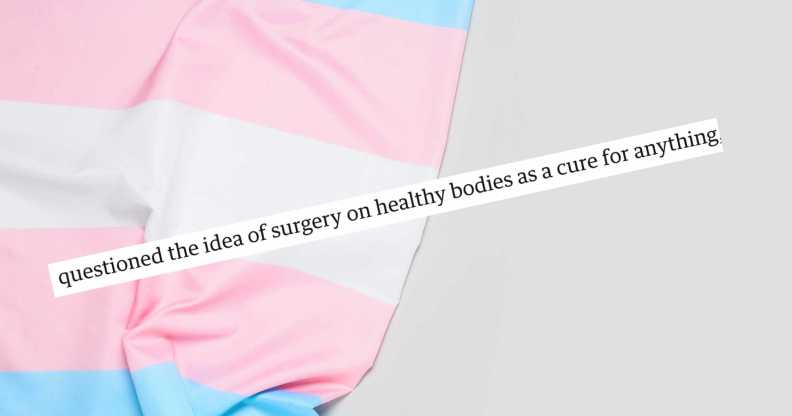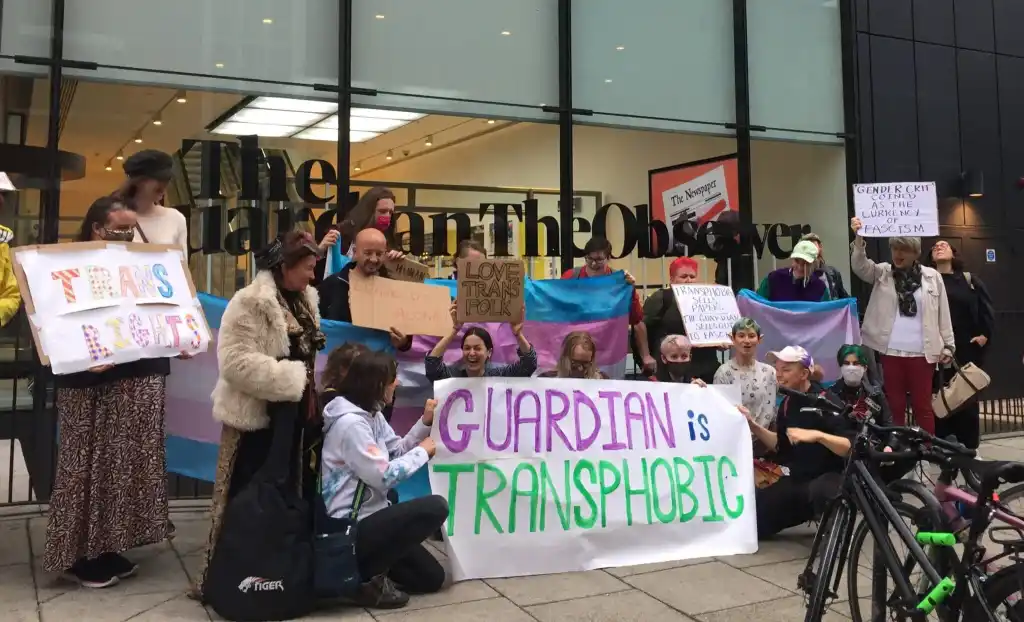The Guardian removes transphobic ‘healthy bodies’ line from Sex Education review

The Guardian have removed a transphobic sentence from Lucy Mangan’s Sex Educations season four review. (Canva/The Guardian)
The Guardian have removed a transphobic sentence from a review of the final series of Sex Education.
The review, written by columnist Lucy Mangan, was published on Thursday (21 September), the same day the fourth and final season of the hit teen comedy-drama dropped on Netflix.
In the original review, Mangan shoehorns a reference to gender affirming surgery on “healthy bodies” into the copy.
Commentary around “healthy bodies” is an anti-trans dog whistle used by groups to delegitimise trans people’s autonomy over their own bodies, medical care and wellbeing.
Mangan wrote: “If Sex Education were staying true to its early, far more radical roots, it might have questioned the idea of surgery on healthy bodies as a cure for anything, but although it hints later at the potential downsides of relentless positivity, here the rule remains absolute affirmation only.”
In the altered, and currently live version, the sentence is changed to: “If Sex Education were staying true to its early, far more radical roots, it might do more than just hint at the potential downsides of relentless positivity, but here the rule remains absolute affirmation only.”
An editorial note is attached to the review at the bottom on the webpage, stating the piece was amended to “clarify a reference to Sex Education’s early radical roots”.
On social media, members of the trans community and allies expressed their dismay at the sentence’s inclusion in the review.
“The idea there’s a significant overlap between viewers of Netflix teen drama Sex Education and people who still read TV reviews in The Guardian is ridiculous enough without them assigning a transphobe to write them,” one user wrote.
“Sex Education isn’t for 50 year old straight women who think a show has ‘radical roots’ because it’s got gay people in it, and who expect them to sprinkle in a little transphobia to make having to see trans people on their TV more palatable.”
Another posted: “This, from the Guardian review of Sex Education, is exactly like an 80s right-wing tabloid saying ‘Why couldn’t they show the positive side of conversion therapy?’ about gay people. How little these people are willing to listen to actual trans experiences and lives.”
PinkNews has approached The Guardian for clarification about this editorial decision and whether the change was made in response to backlash from trans voices and allies.

This is not the first time The Guardian has come under fire for anti-trans editorial content and internal practices.
In October 2021, a protest was held outside the newspaper’s London office, demanding the publication “stop platforming transphobia”.
The protest was the third of its kind in less than a month and followed a column in the The Observer by Catherine Bennett about the murder of Sarah Everard by police officer Wayne Couzens, which linked the rape and murder of Everard to an spurious claim by “gender critical” feminists that trans women should be banned from “single-sex” spaces because they threaten women’s safety.
Natacha Kennedy, who attended the protests, told PinkNews she organised the demonstration because she was “really shocked” at how The Guardian “appropriated Sarah Everard’s murder” to push anti-trans narratives.
Kennedy said: “That was such a horrible crime, there aren’t words for it.
“I thought there would be somebody in the anti-trans community who would do this, one of the really extreme fanatics, but I really did not expect it to be the Guardian using her memory to oppress people.
“I really never thought the Guardian would sink this low.”
More recently, in February James Wong – a botanist, science writer and broadcaster – quit as a columnist for The Observer citing “institutionalised transphobia”.
How did this story make you feel?

